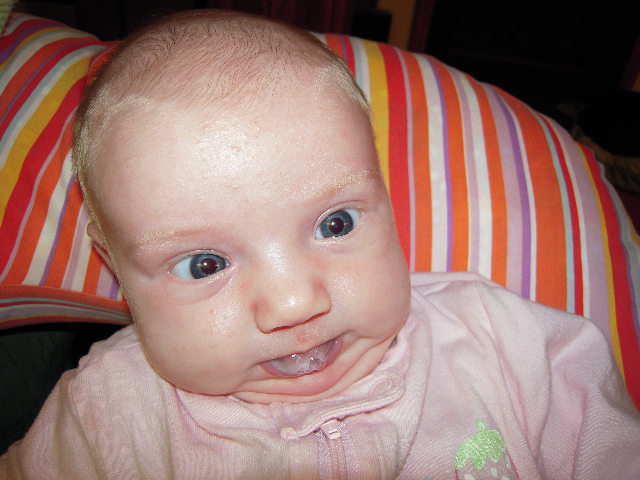Doug, Sorenne and I are celebrating Sorenne’s one month birthday today with naps, laundry, and writing in every spare second. Yesterday we had a visit from the Healthy Start program representative which is part of the State of Kansas Health Department. Rachel weighed the baby who, with her clothes on, is now 11 lbs 15 oz. I have no concerns about her getting enough to eat. What does worry me, however, is how to keep track of the bottles of expressed breast milk in the refrigerator and whether temperature abuse is going to be an issue.
 Breastfeeding has been tricky on numerous levels. Fortunately, storing breast milk is one of the few areas where I’ve found really conflicting advice. The most helpful book I purchased, The Nursing Mother’s Companion by Kathleen Huggins, only briefly covers milk storage stating in a chart that the limit is 72 hours in the refrigerator (p. 189). She contradicts herself elsewhere saying, “You can keep your milk for 24 to 48 hours in the refrigerator or for up to three months in the freezer” (p. 104).
Breastfeeding has been tricky on numerous levels. Fortunately, storing breast milk is one of the few areas where I’ve found really conflicting advice. The most helpful book I purchased, The Nursing Mother’s Companion by Kathleen Huggins, only briefly covers milk storage stating in a chart that the limit is 72 hours in the refrigerator (p. 189). She contradicts herself elsewhere saying, “You can keep your milk for 24 to 48 hours in the refrigerator or for up to three months in the freezer” (p. 104).
Huggins explains that fresh refrigerated milk is somewhat better than frozen because it retains more antibodies, but if you do freeze milk, it should be labeled with the date. Furthermore, “Milk cannot be refrozen or refrigerated after it has been thawed or warmed; whatever is left over after the feeding must be thrown out” (p. 104).
Huggins and multiple other sources discourage reheating milk in the microwave. While Huggins doesn’t explain, the U.S. Food and Drug Administration states that microwaves heat unevenly and may create dangerous hot spots that may burn the baby. In addition, Laura Jana and Jennifer Shu in Heading Home with Your Newborn say that the microwave destroys the protective antibodies found in breastmilk (p. 50).
In a section entitled “Focusing on Food Safety” Jana and Shu also encourage thorough handwashing and drying before preparing formula.
“Do not use prepared formula if it has been left unrefrigerated for more than 2 hours. Once you have fed your baby from a bottle, do not refrigerate the bottle in hopes of using it again later; bacteria from your baby’s mouth can multiply, even in the refrigerator. Be sure to discard any formula remaining in the bottle after 1 hour from the start of your baby’s feeding.” (p. 45)
I am unsure what the authors advise for breastmilk.
On the Lansinoh brand Breastmilk Storage Bags there is a chart indicating “How Long To Store Breastmilk”:
Where Temperature Time
At Room Temperature 66-72 F (19-22 C) 10 hours
In a Refrigerator 32-39 F (0-4 C) 8 days
In a Freezer Compartment inside a Refrigerator Temperature varies 2 weeks
In a Freezer Compartment with a Separate Door Temperature varies 3-4 Months
In a Separate Deep Freeze 0 F (-19 C) 6 Months or longer
FDA’s advice comes from “Breastfeeding Made Easier at Home and Work” at womenshealth.gov and is almost identical. womenshealth.gov, however, gives a detailed breakdown of milk storage times at room temperature:
* At 60 degrees F for 24 hours
* At 66-72 degrees F for 10 hours
* At 79 degrees F for 4-6 hours
* At 86-100 degrees F for 4 hours
FDA also advises to make sure hands are clean and dry before handling milk, to store milk away from the door in the freezer “to avoid changes in temperature that may compromise the milk” and when you need to take the milk with you, “pack it in a cooler filled with ice. Do not leave the milk in a cooler for more than 24 hours.”
Here’s to many more healthy milestones for Sorenne.
